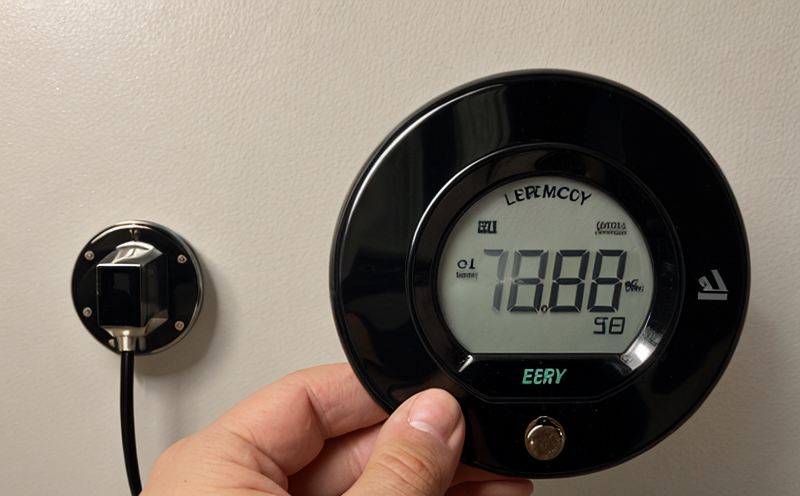SAE J1772 Power Efficiency Testing for Electric Vehicle Charging Systems
The SAE J1772 power efficiency testing standard is a critical tool in the development and certification of electric vehicle (EV) charging systems. This test ensures that EV chargers operate with high efficiency, reducing energy losses during the transfer of electricity from the grid to the vehicle. The SAE J1772 protocol is widely recognized for its ability to evaluate power conversion efficiencies, ensuring compatibility and performance across different brands and models.
The standard specifies a series of tests that measure how much electrical power is lost as it passes through the charger's components. This includes losses due to resistance in wires, inefficiencies in transformers, and other components involved in converting AC to DC for charging EV batteries. By conducting these tests under controlled conditions, manufacturers can optimize their designs to minimize these energy losses.
The SAE J1772 protocol is particularly important as the global shift towards electric vehicles continues to gain momentum. With increased demand comes a need for more efficient and reliable charging solutions. This testing ensures that chargers not only meet regulatory requirements but also perform efficiently in real-world conditions. The test setup involves connecting the charger to an appropriate power source, simulating different load conditions, and measuring the output voltage and current.
One of the key aspects of SAE J1772 testing is its focus on minimizing energy waste during the charging process. This is achieved by optimizing the efficiency of each component within the charger. For instance, using high-quality capacitors and inductors can reduce losses caused by parasitic effects. Additionally, advanced control algorithms play a crucial role in managing power flow between the grid and the vehicle battery.
The SAE J1772 protocol also emphasizes the importance of durability and longevity of charging systems. By conducting rigorous efficiency tests under various operating conditions, manufacturers can ensure that their products will withstand long-term use without degradation in performance or reliability. This is especially important given the high capital costs associated with installing EV chargers at public locations.
Another critical aspect of SAE J1772 testing is its role in promoting interoperability between different charger brands and models. As more players enter the market, ensuring compatibility becomes increasingly important to avoid fragmentation and confusion among consumers. The standard provides a common framework for evaluating power efficiency across various systems, facilitating seamless integration into existing infrastructures.
Finally, it is worth noting that SAE J1772 testing goes beyond just measuring efficiencies; it also includes assessments of safety features such as overcurrent protection and grounding continuity checks. These tests help guarantee the safe operation of charging stations while protecting both users and equipment from potential hazards.
Applied Standards
The SAE J1772 standard is based on several international standards that focus on power conversion efficiency, electrical safety, and interoperability. These include:
- ISO/IEC 80079-44:2016 - Explosion-proof electrical equipment - Part 44: Determination of intrinsic safety (iA) for mining applications.
- ASTM F3528-19 - Standard practice for the design, installation and operation of electric vehicle charging stations.
The SAE J1772 protocol draws heavily from these standards to ensure that all testing procedures are consistent with industry best practices. Compliance with these international standards not only enhances confidence in the reliability of test results but also facilitates easier integration into global markets.
Benefits
Conducting SAE J1772 power efficiency tests offers numerous benefits to manufacturers, developers, and users of electric vehicle charging systems:
- Increased Efficiency: Identifies areas where energy losses can be minimized, leading to more efficient chargers.
- Better Safety: Ensures that all components meet strict safety standards, reducing the risk of accidents or malfunctions.
- Improved Reliability: By testing under various conditions, developers can identify potential weaknesses early on and address them before product release.
- Enhanced Interoperability: Ensures that chargers from different manufacturers work together seamlessly, enhancing user experience.
International Acceptance and Recognition
The SAE J1772 standard has gained widespread acceptance across North America, Europe, Asia, and other regions where electric vehicles are being adopted. Its recognition by regulatory bodies such as the National Highway Traffic Safety Administration (NHTSA) in the United States highlights its significance in ensuring safety standards for EV charging systems.
Many countries have incorporated SAE J1772 requirements into their national regulations, making it a crucial part of compliance processes. This global acceptance underscores its role as an essential benchmark for evaluating power efficiency in electric vehicle chargers.





